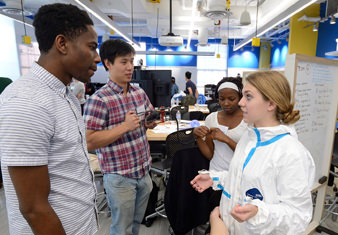
Healing Wounded Warriors
Expanding our connections to the federal government in military health.
In 2014, the Military & Veterans Health Institute began to take flight under the inaugural leadership of retired Army Maj. Gen. James K. Gilman.
The MVHI is a cross-university research partnership that seeks to leverage talent from the schools of Public Health, Medicine, Nursing, and Engineering, the Applied Physics Laboratory, and the Johns Hopkins Health System, to meet the health and health care needs of service members, veterans, and their families.
The focus in the early going has been in two areas. The first has been to fund and promote research in areas such as traumatic brain injury, suicide behavior in military service members, the contraction of malaria by military deployed overseas, and prosthetics for amputees. The second has been to match Johns Hopkins faculty, students, and staff with their counterparts in U.S. Army Medical Research, the Department of Veterans Affairs, the Walter Reed Medical Research Center, and other homes of military health in the U.S. government to identify areas of potential collaboration and need.
The MVHI taps into a rich and ongoing tradition at Johns Hopkins of responding to the medical needs of veterans—from the care that Johns Hopkins Medicine provides to tens of thousands of veterans and their families under a Department of Defense contract with Johns Hopkins HealthCare, to the leadership role the Applied Physics Laboratory has played in creating a neurally controlled prosthetics limb for wounded warriors; to collaborations between Johns Hopkins Medicine and the Applied Physics Laboratory to deliver more effective care for soldiers’ eye injuries, and severe head and neck trauma. And yet, as Maj. Gen. Gilman explains, although many researchers at the university are accustomed to working with the National Institutes of Health or the National Science Foundation, they may be less familiar with the needs of the Department of Defense or the Department of Veterans Affairs.
The MVHI is hoping to continue to bridge these gaps, and forge new partnerships between our university and funding agencies that will empower new kinds of innovative, mission-driven work.

